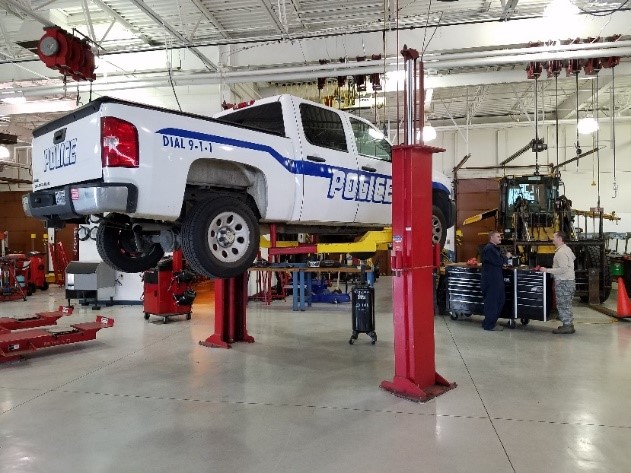Demonstration Overview
 The Defense Logistics Agency (DLA) Aviation Hazardous Minimization and Green Products Branch in coordination with the Office of the Assistant Secretary of Defense for Sustainment and Air Force Research Laboratory – Advanced Power Technology Office (AFRL – APTO) demonstrated fully synthetic bio-based motor oils for use in non-tactical Department of Defense (DoD) and civilian federal agency gasoline powered vehicles.
The Defense Logistics Agency (DLA) Aviation Hazardous Minimization and Green Products Branch in coordination with the Office of the Assistant Secretary of Defense for Sustainment and Air Force Research Laboratory – Advanced Power Technology Office (AFRL – APTO) demonstrated fully synthetic bio-based motor oils for use in non-tactical Department of Defense (DoD) and civilian federal agency gasoline powered vehicles.
The United States Department of Agriculture’s Bio-Preferred Program designates Bio-based engine oil as Engine Crankcase Oil for Federal procurement preference, and defines it as:
“Lubricating products formulated to provide lubrication and wear protection for four-cycle gasoline or diesel engines.”
The Bio-Preferred Program established a minimum of 25% bio-based content for use as Crankcase Oil.
Before DoD and Federal agencies can use bio-based motor oils, the performance of these oils must be proven to meet government requirements and end user needs. The candidate synthetic bio-based motor oils were utilized in vehicles at Military installations and civilian Federal Agency facilities. This demonstration validated the performance of bio-based oils in engines, facilitated awareness of sustainable alternatives to petroleum-based motor oils, and resulted in the assignment of new National Stock Numbers (NSNs) for these bio-based oils, making them available for DoD and civilian Federal Agency procurement.
The demonstration occurred in two phases.
Phase 1: The first phase of the demonstration validated the performance of the bio-based engine oils in non-tactical gasoline vehicles at: four United States Air Force (USAF) installations, one U.S. Navy installation, one U.S. Army installation, one United States Postal Service (USPS) facility, and one Department of Homeland Security (DHS) facility. Each facility changed the oil in accordance with its established interval during an approximate 12-month demonstration period.
For more information regarding the biobased motor oil demonstration, please Contact Us.

Related Articles
Levine, Jay. “NASA Helps Test New Engine Oils.” NASA, 18 Apr. 2018

Phase 2: The second phase of the demonstration further evaluated the performance of these oils when subjected to extended oil change intervals in concert with additional Government operating conditions with the potential for DoD and Federal Agency stakeholders to consider revising their current oil change intervals. Eight USAF installations, one U.S. Navy installation, one DHS facility, and four National Aeronautics and Space Administration (NASA) facilities participated in this phase during an approximate 16-18 month period.
Technology Description
Motor oils lubricate both gasoline and diesel engines. Motor oil is replaced in vehicles during routine maintenance, and is used at every DoD installation in buses, light trucks, vans, and passenger vehicles in support of mission activities. Vehicle Original Equipment Manufacturers (OEM), maintenance manuals, and lubrication orders specify the appropriate SAE viscosity grade and American Petroleum Institute (API) classification for each vehicle. The API classifies and certifies engine oils to performance standards. Biobased engine oils selected for demonstration met vehicle SAE viscosity grade and API classification requirements. API certified biobased engine oils are available in multiple SAE viscosity grades. These products meet USDA BioPreferred Program minimum biobased content requirements and are typically biodegradable. The Benefits of biobased motor oils include:
- Compliance with Federal Directives (FAR, Executive Orders, USDA Bio-Preferred)
- Full synthetic, API-SN certified, enhanced biodegradability
- Potential to extend oil change intervals – product cost savings, labor savings
- Reduced dependency on foreign petroleum
- Expanded market for domestically produced agricultural products
- Reduced lifecycle carbon footprint
- Reduced hazardous waste generation
In addition, the participating biobased motor oil manufacturers claim the following additional benefits, not evaluated under this demonstration:
- 70% average reduction in some pollutant emissions compared to conventional motor oils
- Increased vehicle fuel efficiency – cost savings
Demonstration Products
The demonstration motor oils have API SN certification for gasoline engines, are fully synthetic and derived from renewable base oils, and offer drop in compatibility with petroleum-based engine oils. Table 1 lists the three participating bio-based engine oil manufacturers and the demonstration products
Table 1: Biobased Motor Oil Demonstration Products
| Manufacturer | Demonstration Products |
|---|---|
| Biosynthetic Technologies, LLC | Biosynthetic 5W-20 Motor Oil Biosynthetic 5W-30 Motor Oil |
| BioBlend Renewable Resources, LLC | BioBlend Engine Oil 5W-20 BioBlend Engine Oil 5W-30 |
| Loch Sciences / Marketiquette, Inc. | B2 biOil Supreme Synthetic 5W-20 Motor Oil B2 biOil Supreme Synthetic 5W-30 Motor Oil |
Demonstration Sites
The USAF 441st Vehicle Support Chain Operations Squadron (VSCOS) provided access to USAF vehicles. The biobased motor oils were validated / evaluated in a total 185 non-tactical gasoline powered vehicles at the following DoD installations and Federal Agency facilities:
Phase 1
- Fairchild Air Force Base (AFB)
- Luke AFB
- Malmstrom AFB
- Seymour-Johnson AFB
- Naval Air Station (NAS) Lemoore
- Fort Irwin
- DHS Federal Law Enforcement Training Center (FLETC), Glynco, Georgia
- USPS Merrifield Virginia Vehicle Maintenance Facility
Phase 2
- Joint Base Langley Eustis (JBLE)
- Barksdale AFB
- Patrick AFB
- Nellis AFB
- Offutt AFB
- F.E. Warren AFB
- Holloman AFB
- Dyess AFB
- Naval Air Weapons Station (NAWS) China Lake
- DHS FLETC
- NASA Langley Research Center (LaRC)
- NASA Kennedy Space Center (KSC)
- NASA Armstrong Flight Research Center (AFRC)
- NASA Whites Sands Test Facility (WSTF)
Demonstration Details
Each phase had its evaluations plans that outlined the demonstration activities which would be performed. These plans provided an overview of the sites, summarized the selected vehicles, identified their requirements, and the key performance criteria, as well as the oils to be evaluated. Additionally, the plans noted the data to be collected, its methods of analysis, as well as the roles and responsibilities of demonstration participants and stakeholders.
Table 2 contains the key performance criteria that the DoD and Federal Agency stakeholders established to evaluate and validate that these oils met the participants’ requirements
Table 2: Demonstration Performance Criteria
| Criteria | Parameters |
|---|---|
| Vehicle Performance |
|
| Oil Properties |
|
Prior to the change to the bio-based oil, vehicle maintenance personnel drained the demonstration vehicles of their current oil, and obtained a sample of the used oil from each vehicle to have it subjected to an analysis to establish baseline wear, metal levels as well as to identify any pre-existing engine conditions. At several sites, vehicles were selected to serve as “controls” since they would use the petroleum-based oil common to the site. These vehicles would be monitored alongside the vehicles having the bio-based engine oil. At predetermined intervals, specific to each site, vehicle maintenance personnel took oil samples from each vehicle based on mileage, hours, or time intervals, or a combination of these factors. An independent third party performed the oil analysis testing on each sample.
The results of each oil analysis determined if the engine oil was providing sufficient wear protection and whether its performance was depleted and should be changed in terms of the criteria so noted below.
- Rate of wear metal accumulation
- Rate of contaminant accumulation
- Rate of TBN depletion
Demonstration Results
Overall, the biobased engine oils met the identified performance requirements in the demonstration vehicles with no reported vehicle engine operation or performance issues. The performance of the biobased motor oils was comparable to full synthetic petroleum-based motor oils used in the baseline demonstration vehicles. Analysis of demonstration vehicle oil samples resulted in the following findings:
- Wear metals concentrations are an indicator of oil wear prevention properties. Overall, the biobased engine oil analysis indicated that the biobased engine oils did not result in increased engine wear metal levels for the five common gasoline engine wear metals: Iron (Fe), Lead (Pb), Aluminum (Al), Copper (Cu), and Chromium (Cr). All engine wear analysis results were within acceptable limits, except for a few isolated samples.
- Silicon (Si) contamination levels are an indication of sand/dust contamination in the oil. Si levels in the oil were evaluated for each sample. It was determined that Si contamination is unique per demonstration site location and vehicle operating conditions. Si contamination was determined to be independent of the type of engine oil used. For some demonstration sites in hot, dry, dusty, sandy environments, the engine oil Si concentration reached the maximum acceptable limit before the oil performance properties were depleted. These results indicate that Si contamination may be a driver for establishing vehicle oil change intervals in some locations/operating conditions.
- TBN is a key indicator of additive depletion and is commonly used in oil analysis testing to determine if the oil is approaching the end of its useful life or is suitable for continued use. The TBN value is a measurement of base additive remaining in the oil used to neutralize acidic fuel combustion by-products. The rate of TBN depletion for the biobased engine oils was comparable to petroleum-based engine oils for the demonstration vehicles. The rate of TBN depletion was greater in high-idle vehicles, such as Security Force vehicles, and therefore vehicle duty should be considered when establishing oil change intervals.
Demonstration Product National Stock Numbers
As a result of the successful demonstration as well as Service requests for these products, DLA Aviation established the National Stock Numbers (NSNs) noted in Table 3, for fully synthetic biobased motor oils that have API SN certification and meet the USDA’s Bio-Preferred minimum bio-based content requirement.
Table 3: Biobased Motor Oil NSNs
| NSN | SAE Viscosity | Unit of Issue |
|---|---|---|
| 9150-01-678-3243 | 5W-20 | Box of 12 one-quart bottles |
| 9150-01-678-3251 | 5-gallon container | |
| 9150-01-678-3210 | 55-gallon drum | |
| 9150-01-678-3223 | 5W-30 | Box of 12 one-quart bottles |
| 9150-01-678-3215 | 5-gallon container | |
| 9150-01-678-2942 | 55-gallon drum |
